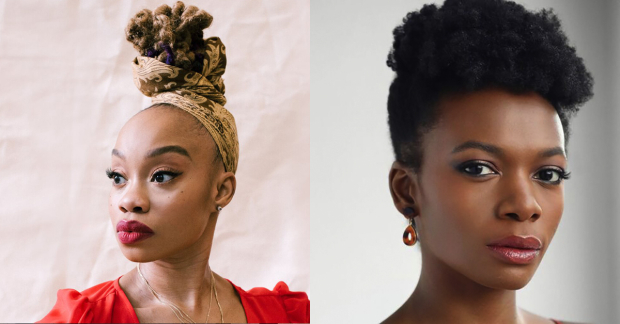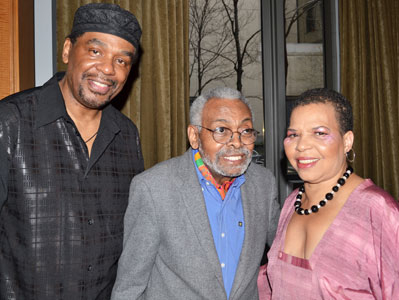Interview: Kimber Elayne Sprawl Talks to Camille A. Brown About Building For Colored Girls in 2022
Brown directs and choreographs Ntozake Shange’s seminal choreopoem at the Booth Theatre.
For the first time in six decades, a Broadway show is being directed and choreographed by a Black woman. Ntozake Shange's for colored girls who have considered suicide / when the rainbow is enuf is returning to its original Times Square home, the Booth Theatre, with Tony Award-nominated choreographer Camille A. Brown in her directorial debut.
Even the original production of for colored girls was directed by a man, Oz Scott, and this sobering statistic leading to her history-making is not lost on Brown. But it's just another step in the show's legacy. After all, Brown believes that the experience is bigger than any one person, and she's just lucky enough to be putting this forward as her offering to the community.
In a recent conversation with Girl From the North Country star Kimber Elayne Sprawl (who has her own family history with Shange's legendary choreopoem), Brown told us about the process of putting this new production together.

(© Josefina Santos/Nathan Johnson)
This conversation has been condensed and edited for clarity.
Kimber Elayne Sprawl: When For Colored Girls was originally being developed, it became part of the fabric of politics at a time when South Africa was experiencing Apartheid and Nelson Mandela and Angela Davis were both in prison. Are there any aspects of your revival that are influenced by the state of the world today?
Camille A. Brown: Everything. I mean Ketanji Brown Jackson was just confirmed to the Supreme Court and we all saw how she has been treated throughout the whole experience. It's important for Black women to hold each other and hold space for each other now more than ever. It's always been important, but this piece gives you a playbook about sisterhood and love, and how you can't just carry that onto the stage; it has to be created from the ground up. And even though there was a reckoning happening in the 70s, there's a reckoning happening now too. So, what does that look like in our show? How do we create a space where these words can be seen as timeless?
Kimber: Ntozake Shange said that she's most proud that the play has been passed down through generations and passed horizontally through friendships and sisterhoods, in so many different mediums. You're carrying on that legacy now. What does that responsibility mean to you?
Camille: Oh, it's huge. This piece is over 40 years old, and I wanted to hold it with the best care that I could, which is a huge responsibility. I also remembered that other people made different interpretations of it and contributed their voice, so I got into a space when I was working on this where I was getting in my own way. I started thinking "ok, this is a legacy piece, so you treat it with care, but how do you also bring yourself to it?" And I had to get out of my own way. A friend reminded me that this is my offering, so I look at it like that. I have to make sure I put my own voice in there.
Kimber: The play has been a gift to so many people and it's a pivotal part of culture not only in the Black community, but for theater in general. I have pictures of being on my mom's lap as she recites the Lady in Blue to me, and she still knows it today. Do you have any moments of nostalgia for the piece from your own life that you pulled from for this production?
Camille: I love that. My mom always told me "never let anyone take your stuff away." She never referenced the show, but she's been telling me that for as long as I can remember, whenever I was down on myself, in order to encourage me. It wasn't until I did the 2019 version at the Public as the choreographer that she told me this is where she got it from. I just feel like this piece has been a part of me in some way for my entire life, and now, when listening to that poem, I have that in mind and am so amazed that the Broadway production has stayed with her and she passed it on to me.

(© David Gordon)
Kimber: You're making history as the first Black woman to direct and choreograph a Broadway show in six decades, which was crazy to me. Halle Berry says in an interview that when she won the Academy Award for Best Actress, she felt the moment was bigger than herself, that she unlocked the door and went through it, and there would be so many others to follow. When she realized that the moment wasn't bigger than her, that was just her, she said it was heartbreaking. Do you relate to that in any way?
Camille: I think everything is bigger than me. It's never just about you. I've been in spaces where I'm the only Black person, the only woman, the only Black woman. I was the first Black director at the Met this past season. None of that is lost on me in any way. I didn't know that directing and choreographing on Broadway was possible because, as you said, it hasn't happened in six decades. My hope is that it's not beyond someone else's understanding coming after me.
A friend asked me recently how I was feeling, and then she said,"One of these days, I'm going to ask you how you're really feeling, because I know it's all on you." And it does feel like that. But I do know that I have a world of support from family and friends, and you can't do it alone. Yes, it is about paving the way for other people, but it's also about the village that surrounds you in order to get through these doors. I have my tribe, which has talked me through this and helped me believe that I can do this, and I wouldn't have been able to do that on my own.
Kimber: People who aren't familiar or don't understand the show can perceive it to be dark or sad. As a Black woman, I'd call it real or honest, and sometimes when you get real and honest on a deeper level, it can be raw, but the Black woman's process and plight gets pinned as dark and sad. You bring so much joy through movement, song, and laughter. Can you elaborate on that Black Girl Joy and why it was imperative for you to make sure that resonated throughout the process?
Camille: As a Black woman, I know that we are dimensional. And if we are dimensional, it is important to show those dimensions. The work has the pain, has the joy, has the celebration, has the sisterhood, so how do you bring that forth in a way that speaks to Ntozake Shange's words and allows the cast to come to it with honesty and their true, vulnerable selves? They have all of that in them, so that's what was exciting to me, seeing them come to it with their true selves and how it resonates with them today. We are all clear that this is a legacy, so this is exciting to come together as a sisterhood.
I know there are usually table reads that happen on the first day of rehearsal, but I danced them through all of the moments, and it was amazing to have that experience with them. Now we're in the middle of previews and we're seeing how they're interacting with the audience, because that was the last element. They're all storytellers in the space. Now they can truly tell these stories to people and make these connections, because that is really what the show is about.











